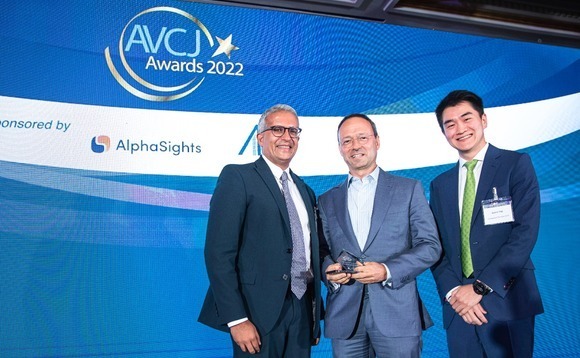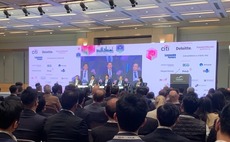
AVCJ Awards 2022: Firm of the Year – Large Cap: Baring Private Equity Asia

Baring Private Equity Asia’s 2022 was punctuated by a high-profile merger with EQT, a bumper fundraise, and USD 10bn in exits. Jean Eric Salata, now head of BPEA EQT, shares his thoughts on the market
Q: How do you feel about investment right now?
A: I think that 2023 and 2024 will be interesting vintages and great entry points for private equity investors. There was a pause – macro conditions were uncertain – and now we are starting to see things settle down. China is re-opening and some of the regulatory crackdowns are easing. Engagement between the US and China is improving. The global macro picture seems to be improving as well: the interest rate cycle is settling down; inflation is peaking; there are some positive signs out of Europe, with Germany's chancellor saying the country is unlikely to go into recession this year; the Ukraine war continues, but the world appears to have adjusted to that and figured out how to handle energy. Generally, it's not so much a worst-case scenario, with a massive pullback and correction, and more a business cycle. We have greater clarity and higher conviction on opportunities we are seeing today compared to 12 months ago.
Q: What about Asia specifically?
A: Asia is far ahead of the rest of the world in terms of position in the cycle. Our growth rates are better, our monetary policy is looser, and we have less of an inflation problem. I'm much more optimistic on China than I was even two or three months ago. [Chinese Vice Premier] Liu He was in Davos and met with the US treasury secretary, and then we saw Xi [Jinping] and [Joe] Biden sit down for three hours in Bali last November. What I would add about private equity in Asia is that it hasn't been an easy fundraising environment. We have been ahead of the curve a bit and we have a lot of dry powder at a time when we see less competition from other large funds.
Q: How are geopolitical factors addressed at the investment committee level?
A: A lot of externalities come into our thinking now that didn't before in terms of how the world is dividing. It's not just supply chains, but also foreign investment policy and de-globalisation. Other countries have their own versions of CFIUS [the Committee on Foreign Investment in the US] – to the point that it seems easier to invest in China than in companies with exposure to Europe and the US. The dynamic of the world being fully integrated is taking a back seat and the focus is on security and national interests, especially as they relate to subsidising the transition to green energy. To some extent, this is understandable. We are in a new era characterised by energy transition and huge technological evolutions. The variables are changing, so countries need to adjust their policies. It makes the environment more complicated for investors, but it also creates a lot of new opportunities – for example, national champions will be created in different parts of the world. On the other hand, when it comes to exits, the number of strategic buyers for these assets might be limited because of increased cross-border scrutiny. Public market exits could become the preferred avenue in those situations.
Q: Does de-globalisation mean fewer cross-border deals?
A: We won't decrease our level of activity in cross-border investments. It's important to be very thematic and sector-specific. IT services in India is cross-border by its very nature because you are supplying services to global companies from India. Pet food is an innocuous industry that isn't affected by geopolitics, and you see large strategic players from the US investing in China without any regulatory scrutiny. As for technology and areas like semiconductors, it's a very different discussion.
Q: What does a hard-to-access US financing market mean for Asia buyouts?
A: The US market hasn't closed but it's become a lot more expensive and the quantum of debt available is less – the cost of term loan B-style financing has really skyrocketed, nearly doubling the all-in cost. Asia is much more open. The cost and availability of financing is about the same and then it's traditional senior loan-type consortium lending you see among Asian banks. Some of the larger cross-border deals have become more problematic in this environment. Previously, taking on a USD 10bn transaction was fine. Now you would struggle to get it financed. It's not just the terms of the debt, but also the equity syndication because a lot of investors have pulled back from direct co-investments. We have a bit of an advantage right now, because with a USD 11.2bn fund, we can underwrite large equity cheques.
Q: Did this contribute to a slower pace of deployment in 2022?
A: We invested about USD 3.2bn, which is down 20% on the previous year. There was a big slowdown going into the second half of the year. Prices have adjusted and they need to adjust further. With the issues around leverage and questions about exit multiples, to make the math work we must adjust the prices we pay for assets – because we haven't changed the return we underwrite to. What we have done a lot of is bolt-on acquisitions. There have been 25 in the last 12 months, six of them involving Nord Anglia Education, which is one of our largest investments and doing extremely well. Bolt-ons are an interesting feature of this environment. You can make small acquisitions at reasonable prices and use them to drive scale and add value.
Q: How about exits?
A: We've generated USD 10bn in exits over the last 18 months – that has proven in hindsight to be an important move. About 70% of our exits were sales, of which more than half were sponsor-related, and the other 30% was public market-related or dividend recap-related.
Q: Isn't the sponsor-to-sponsor share surprisingly – and historically – high?
A: It's a large number, but not an unhealthy industry dynamic. Ten years ago, we had much less of that. You had to rely on a trade buyer getting interested in a business or, more likely than not, an IPO. That led to a challenging and illiquid exit environment and lower returns in terms of IRR. What we have now, like the rest of the world, is a deep market – almost like a capital market. The universe of buyers is larger and that lowers the risk for investors in Asia and it has improved returns.
Q: There was a spike in sponsor-to-sponsor deals in Asia at the end of 2021, with ample dry powder and a low cost of capital were cited as contributing factors. Why is this channel still so active despite the tougher investment environment?
A: Because those tend to be the best assets. In this environment, people gravitate towards known quantities and they buy from reputable sponsors. A lot of businesses have generally performed well over the last five years because sponsor owners have done the right things, put in the right leadership teams, and picked the right sectors. And these tend to be choice assets – they are market leaders or in the top three in a sub-sector. That makes them much easier to get your arms around.
Q: Where else do you expect to see more large-cap deal flow?
A: There is an increasing amount of corporate carve-out activity. Those deals tend to be more complicated and take longer, but they will grow in number. In addition, we have seen some evidence of multinational decoupling in the region – carve-outs are coming from global players as opposed to Japanese conglomerates. Then there are take-privates. We've looked at a number, we know others are looking at them, but not many have transacted. Part of the problem is the debt markets, given the size of those deals. There has also been a lack of interest or willingness to sell on the part of boards that feel there was a knee-jerk steep correction last year. Even though there are lots of opportunistic buyers, they don't think it's the right time to do a deal.
Q: In addition to writing bigger cheques, what does a larger fund enable you to do?
A: We can expand resources and capabilities, investing in people who cover sectors or do operations. Following the EQT merger, we now have a dedicated team in Asia for digital transformation work. There is also the "mother brain," an internal platform based on data science and artificial intelligence, which is driving analytics and insights into our businesses and helping us maintain a competitive edge.
Q: What do private equity firms need to be competitive in Asia?
A: You need to be very local to understand the region – there couldn't be two markets more different than India and Japan. You need teams on the ground, and you need to have trust, processes, and central decision-making to form a portfolio view and an investment committee view on very different and distinct underlying markets. Developing the teams, the know-how, the credentials, the track record, the relationships – it isn't easy, and it takes time. Historically, this has prevented people from scaling up in the region. There is also a lot of blocking and tackling: buying businesses in sectors where you have a strong view; finding the right advisors and executives working with you so you understand the dynamics; and having a transformation toolkit and playbook, so you know how to take these businesses from where they are today to where you want them to be in five years. Private equity generates above-average returns as an industry because it's a hands-on, active strategy. It's not enough just to have a transformation plan. Everything adds up and that's what gives you those better-than-market returns on a consistent basis.
Q: Does being competitive in Asia also mean being more global?
A: There is a role for firms that specialise in Asia and focus on certain areas, but if you want to compete for larger buyouts, that's harder and harder to do that without global links. Industries are increasingly global, so you must make decisions based on what is happening globally, not just on what is happening in Asia. That requires a global network and a global team. We were doing it on our own, but I was starting to feel that we didn't have the capabilities to deliver the same returns over time as some of the global firms. It will become more difficult over time for players that are purely regional or focused on single countries.
Q: Are we likely to see more M&A activity along the lines of BPEA-EQT?
A: It's not easy to see something like this happening again. Cultural fit and people fit are very important. The two firms must also be at similar stages of evolution. When one firm that is very well developed outside the region comes together with one that is developed in the region, that's hand in glove. You don't want situations where there is a lot of overlap because that will create a lot of problems in post-merger integration. The European and Asian angles were also helpful. There is a similar history and culture, growing up in markets with lots of different geographies and local languages. The Europe-Asia fit is a good one. I think US-Asia is harder, in terms of time zones and in terms of cultural backgrounds.
Pictured: Jimmy Mahtani (left) and Jean Eric Salata (centre) of BPEA EQT with Kelvin Yap of HabourVest Partners
Latest News
Asian GPs slow implementation of ESG policies - survey
Asia-based private equity firms are assigning more dedicated resources to environment, social, and governance (ESG) programmes, but policy changes have slowed in the past 12 months, in part due to concerns raised internally and by LPs, according to a...
Singapore fintech start-up LXA gets $10m seed round
New Enterprise Associates (NEA) has led a USD 10m seed round for Singapore’s LXA, a financial technology start-up launched by a former Asia senior executive at The Blackstone Group.
India's InCred announces $60m round, claims unicorn status
Indian non-bank lender InCred Financial Services said it has received INR 5bn (USD 60m) at a valuation of at least USD 1bn from unnamed investors including “a global private equity fund.”
Insight leads $50m round for Australia's Roller
Insight Partners has led a USD 50m round for Australia’s Roller, a venue management software provider specializing in family fun parks.








